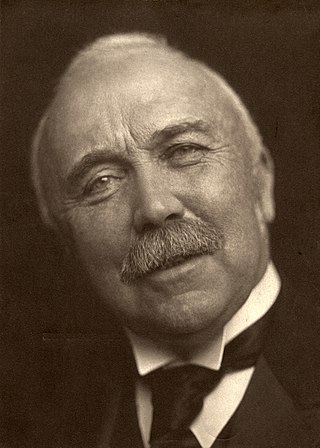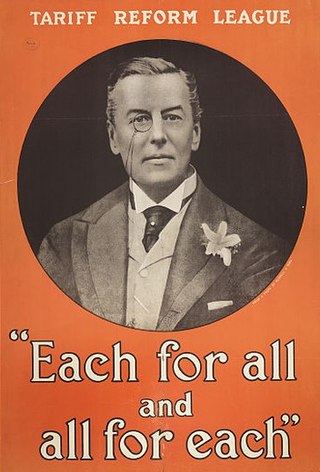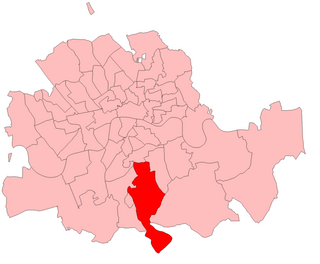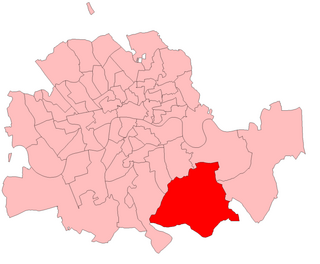Related Research Articles

Joseph Chamberlain was a British statesman who was first a radical Liberal, then a Liberal Unionist after opposing home rule for Ireland, and eventually served as a leading imperialist in coalition with the Conservatives. He split both major British parties in the course of his career. He was the father, by different marriages, of Nobel Peace Prize winner Austen Chamberlain and of Prime Minister Neville Chamberlain.
The Liberal Unionist Party was a British political party that was formed in 1886 by a faction that broke away from the Liberal Party. Led by Lord Hartington and Joseph Chamberlain, the party established a political alliance with the Conservative Party in opposition to Irish Home Rule. The two parties formed the ten-year-long coalition Unionist Government 1895–1905 but kept separate political funds and their own party organisations until a complete merger between the Liberal Unionist and the Conservative parties was agreed to in May 1912.

The 1906 United Kingdom general election was held from 12 January to 8 February 1906.

George Joachim Goschen, 1st Viscount Goschen was a British statesman and businessman best remembered for being "forgotten" by Lord Randolph Churchill. He was initially a Liberal, then a Liberal Unionist before joining the Conservative Party in 1893.

A coalition of the Conservative and Liberal Unionist parties took power in the United Kingdom shortly before the 1895 general election. Conservative leader Lord Salisbury was appointed Prime Minister and his nephew, Arthur Balfour, became Leader of the House of Commons, but various major posts went to the Liberal Unionists, most notably the Leader of the House of Lords, the Liberal Unionist Duke of Devonshire, who was made Lord President, and his colleague in the Commons, Joseph Chamberlain, who became Colonial Secretary. It was this government which would conduct the Second Boer War from 1899–1902, which helped them to win a landslide victory at the 1900 general election.
The Coefficients was a monthly dining club founded in 1902 by the Fabian campaigners Sidney and Beatrice Webb as a forum for British socialist reformers and imperialists of the Edwardian era. The name of the dining club was a reflection of the group's focus on "efficiency".

Walter Hume Long, 1st Viscount Long,, was a British Unionist politician. In a political career spanning over 40 years, he held office as President of the Board of Agriculture, President of the Local Government Board, Chief Secretary for Ireland, Secretary of State for the Colonies and First Lord of the Admiralty. He is also remembered for his links with Irish Unionism, and served as Leader of the Irish Unionist Party in the House of Commons from 1906 to 1910.

Henry Chaplin, 1st Viscount Chaplin was a British landowner, racehorse owner and Conservative Party politician who sat in the House of Commons from 1868 until 1916 when he was raised to the peerage.
Imperial Preference was a system of mutual tariff reduction enacted throughout the British Empire as well as the then British Commonwealth following the Ottawa Conference of 1932. As Commonwealth Preference, the proposal was later revived in regard to the members of the Commonwealth of Nations. Joseph Chamberlain, the powerful colonial secretary from 1895 until 1903, argued vigorously that Britain could compete with its growing industrial rivals and thus maintain Great Power status. The best way to do so would be to enhance internal trade inside the worldwide British Empire, with emphasis on the more developed areas — Australia, Canada, New Zealand, and South Africa — that had attracted large numbers of British settlers.

The Tariff Reform League (TRL) was a protectionist British pressure group formed in 1903 to protest against what they considered to be unfair foreign imports and to advocate Imperial Preference to protect British industry from foreign competition. It was well funded and included politicians, intellectuals and businessmen, and was popular with the grassroots of the Conservative Party. It was internally opposed by the Unionist Free Food League but that had virtually disappeared as a viable force by 1910. By 1914 the Tariff Reform League had approximately 250,000 members. It is associated with the national campaign of Joseph Chamberlain, the most outspoken and charismatic supporter of Tariff Reform. The historian Bruce Murray has claimed that the TRL "possessed fewer prejudices against large-scale government expenditure than any other political group in Edwardian Britain".
Free Trader was a political label used in the United Kingdom by several candidates in the 1906 general election and January 1910 general election. Many were Conservative Party or Liberal Unionist politicians opposed to Joseph Chamberlain's campaign for tariff reform.

The 1903 Dulwich by-election was a by-election held on 15 December 1903 for the British House of Commons constituency of Dulwich in South London.

The 1903 Lewisham by-election was a by-election held on 15 December 1903 for the British House of Commons constituency of Lewisham.

Sir John Henry Birchenough, 1st Baronet, was an English businessman and public servant.
The 1904 Ashburton by-election was a parliamentary by-election held in England on 7 January 1904 to elect a new Member of Parliament (MP) for the British House of Commons constituency of Ashburton in Devon. It was triggered by the death of the sitting Liberal Party MP Charles Seale-Hayne.

The early life, business career and political rise of Neville Chamberlain culminated on 28 May 1937, when he was summoned to Buckingham Palace to "kiss hands" and accept the office of Prime Minister of the United Kingdom. Chamberlain had long been regarded as Prime Minister Stanley Baldwin's political heir, and when Baldwin announced his retirement, Chamberlain was seen as the only possible successor.
Charles Jeremy Mawdesley Hardie, CBE is a British economist and businessman.

The Unionist Free Food League was a British pressure group formed on 13 July 1903 by Conservative and Liberal Unionist politicians who believed in free trade and who wished to campaign against Joseph Chamberlain's proposals for Tariff Reform, which would involve an import tax on food. About 40 Conservative and 20 Liberal Unionist MPs attended the initial meeting. The former Unionist Chancellor of the Exchequer, Sir Michael Hicks Beach, became president of the group. He was replaced in October 1903 by the Liberal Unionist party leader, the Duke of Devonshire.
Sir Francis Mowatt was a British civil servant. He was a radical and Liberal civil servant at the Head of the Treasury. His influence was felt at a time of expansion in governmental activities.

Sir Vincent Henry Penalver Caillard was a British Army officer, diplomat, financier, company director and municipal politician.
References
- ↑ A J MARRISON. "The Tariff Commission, Agricultural Protection and Food Taxes, I9O3-13" (PDF). Bahs.org.uk. Retrieved 22 December 2017.
- 1 2 "Collection: Tariff Commission". Archives.lse.ac.uk. Retrieved 22 December 2017.
- ↑ RPT Davenport Hinds, ed. (2013). Business in the Age of Depression. Routledge. ISBN 9781138988026.
- ↑ "Report on the Work of the Tariff Commission". archives.lse.ac.uk. November 1917. Retrieved 31 August 2023.